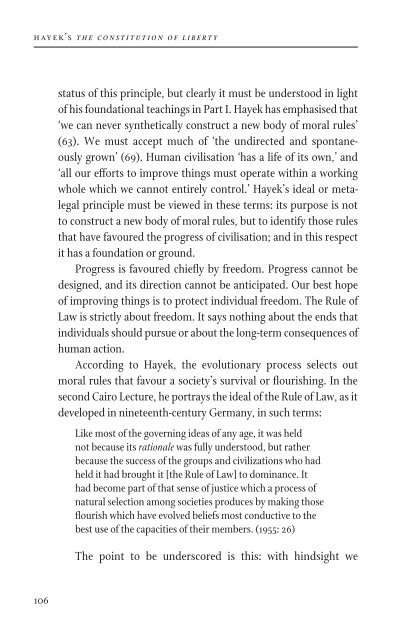Hayek's The Constitution of Liberty - Institute of Economic Affairs
Hayek's The Constitution of Liberty - Institute of Economic Affairs
Hayek's The Constitution of Liberty - Institute of Economic Affairs
You also want an ePaper? Increase the reach of your titles
YUMPU automatically turns print PDFs into web optimized ePapers that Google loves.
h ay e k ’ s t h e c o n s t i t u t i o n o f l i b e r t y<br />
t h e r u l e o f l aw a n d i t s d e t r a c t o r s<br />
status <strong>of</strong> this principle, but clearly it must be understood in light<br />
<strong>of</strong> his foundational teachings in Part I. Hayek has emphasised that<br />
‘we can never synthetically construct a new body <strong>of</strong> moral rules’<br />
(63). We must accept much <strong>of</strong> ‘the undirected and spontaneously<br />
grown’ (69). Human civilisation ‘has a life <strong>of</strong> its own,’ and<br />
‘all our efforts to improve things must operate within a working<br />
whole which we cannot entirely control.’ Hayek’s ideal or metalegal<br />
principle must be viewed in these terms: its purpose is not<br />
to construct a new body <strong>of</strong> moral rules, but to identify those rules<br />
that have favoured the progress <strong>of</strong> civilisation; and in this respect<br />
it has a foundation or ground.<br />
Progress is favoured chiefly by freedom. Progress cannot be<br />
designed, and its direction cannot be anticipated. Our best hope<br />
<strong>of</strong> improving things is to protect individual freedom. <strong>The</strong> Rule <strong>of</strong><br />
Law is strictly about freedom. It says nothing about the ends that<br />
individuals should pursue or about the long-term consequences <strong>of</strong><br />
human action.<br />
According to Hayek, the evolutionary process selects out<br />
moral rules that favour a society’s survival or flourishing. In the<br />
second Cairo Lecture, he portrays the ideal <strong>of</strong> the Rule <strong>of</strong> Law, as it<br />
developed in nineteenth-century Germany, in such terms:<br />
Like most <strong>of</strong> the governing ideas <strong>of</strong> any age, it was held<br />
not because its rationale was fully understood, but rather<br />
because the success <strong>of</strong> the groups and civilizations who had<br />
held it had brought it [the Rule <strong>of</strong> Law] to dominance. It<br />
had become part <strong>of</strong> that sense <strong>of</strong> justice which a process <strong>of</strong><br />
natural selection among societies produces by making those<br />
flourish which have evolved beliefs most conductive to the<br />
best use <strong>of</strong> the capacities <strong>of</strong> their members. (1955: 26)<br />
<strong>The</strong> point to be underscored is this: with hindsight we<br />
recognise that adherence to the Rule <strong>of</strong> Law has promoted such<br />
social ends as survival, success or flourishing; but since the future<br />
is open and uncertain, Hayek seldom justifies his ideal in terms <strong>of</strong><br />
its likely consequences. <strong>The</strong> Rule <strong>of</strong> Law is strictly about freedom.<br />
It is constructed from evolved moral rules that safeguard liberty.<br />
Its aim is to protect individual freedom here and now and to open<br />
up the possibility <strong>of</strong> human development.<br />
<strong>The</strong> Rule <strong>of</strong> Law is an outgrowth <strong>of</strong> Western civilisation, but<br />
Hayek puts it forward as a universal ideal and not one just for<br />
Western nations. He provides no clear explanation as to how a<br />
particular ideal becomes a standard for all, but he does suggest<br />
two possibilities: the Rule <strong>of</strong> Law <strong>of</strong>fers a pattern for nations<br />
that aspire to match the creative achievements <strong>of</strong> the West; or<br />
since modernity has produced a universal civilisation, shaped by<br />
Western ideas and institutions, the West’s guiding ideal is now<br />
the standard for civilisation as such.<br />
Detractors <strong>of</strong> the Rule <strong>of</strong> Law<br />
Chapter 16 examines ‘<strong>The</strong> Decline <strong>of</strong> the Law.’ This decline began<br />
in Germany soon after institutions designed to secure the Rule<br />
<strong>of</strong> Law were completed. Political and theoretical views emerged<br />
that strongly opposed limiting authority by rules <strong>of</strong> law. <strong>The</strong>y<br />
sought ‘to give the organized forces <strong>of</strong> government greater power<br />
to shape social relations deliberately according to some ideal <strong>of</strong><br />
social justice’ (235). Opinion soon turned against free institutions,<br />
making them incapable <strong>of</strong> serving their intended aims.<br />
Chapter 16 is mostly about legal theories that rejected or<br />
redefined the Rule <strong>of</strong> Law. <strong>The</strong>y originated in Germany, but soon<br />
came to have wide influence in other Western countries, such as<br />
106<br />
107












